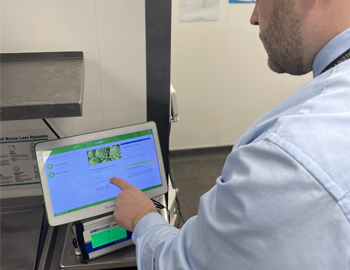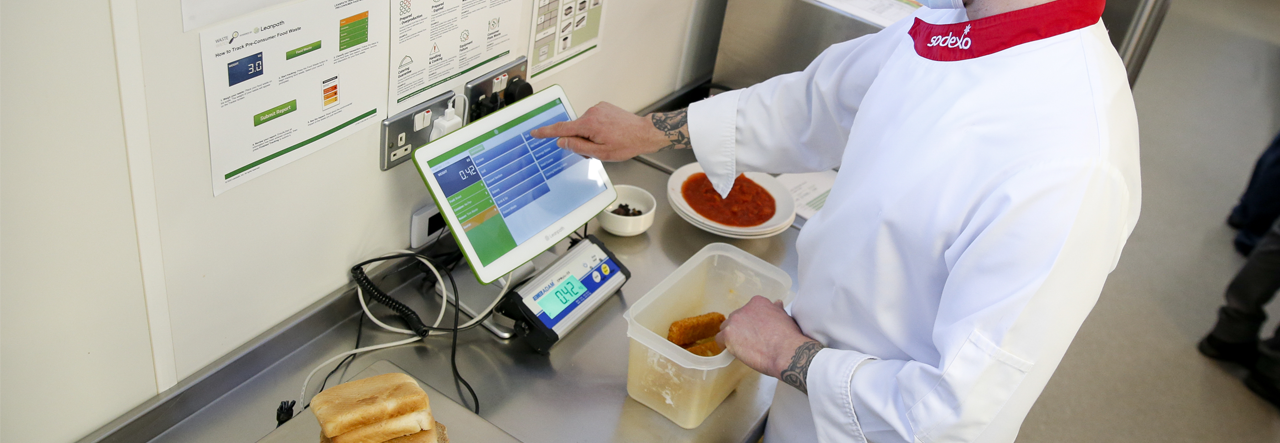Food waste is one of the greatest contributors to climate change and biggest scandals of our time. As a vital lever of our net zero 2040 journey, Sodexo has pledged to halve food waste by 2025 – with so many of our clients, partners and colleagues playing an active role. In this series, we introduce you to some of the people across our business who have an Appetite for Action on fighting food waste.
 Ollie Penn is Sodexo’s Deputy Operations Manager at leading private school, Wellington College.Serving 3,500 meals a day to tight timescales poses particular challenges for food waste reduction, but with staff and students fully on board there’s no shortage of ideas. Ollie explains what’s been achieved, what’s coming next, and why he’s optimistic about his own personal food waste targets.
Ollie Penn is Sodexo’s Deputy Operations Manager at leading private school, Wellington College.Serving 3,500 meals a day to tight timescales poses particular challenges for food waste reduction, but with staff and students fully on board there’s no shortage of ideas. Ollie explains what’s been achieved, what’s coming next, and why he’s optimistic about his own personal food waste targets.
Learning to loathe food waste
I hate food waste. Probably because I’ve been looking at it in one form or another for about 10 years. I first came to Wellington College for a part-time job when I was studying catering and hospitality. I started in the plate wash area, and the volume of food that the students left behind just blew me away. In the years that followed, including a Sodexo management training programme where I learnt the whole catering process from loading bay to plate, I’ve seen how far we’ve come and can see the opportunities ahead too.
We have a team of 170 here, responsible for feeding 1,200 pupils and hundreds of staff and visitors through busy days of learning, teaching and physical activity. That’s our priority. We know that our breakfast service, which is a nutritious hot meal for 800 boarders completed in just 45 minutes, won’t ever be zero waste. We can’t risk running out and having people go hungry and students don’t have the time to wait for us to rustle something up on demand. The point is to bring food waste down to the lowest level we can across breakfast, lunch and supper.
Introducing WasteWatch
Wellington College leads the way on environmental issues and has a very active, student-led sustainability team. They were keen for us to introduce WasteWatch because it shows us the ‘when, what and why’ of food waste so we can reduce it.
My manager knew straight away I’d want to get my hands on it, so he asked me to lead its implementation.
Since October 2022, we’ve used WasteWatch to measure kitchen waste and plate waste, which means we weigh everything that’s left after a service and log the details. Our first priority was working with our 20 chefs to reduce how much we waste in production, and it’s become a real source of pride when that number is low. Now, we’re gearing up to tackle what’s left on students’ plates.
Engaging pupils and making changes
When we first introduced WasteWatch, I visited all 18 houses at Wellington College to speak to the students. I explained the link between food waste and greenhouse gas emissions, told them about WasteWatch and asked for their support. As part of that, we asked them to tell us which three meals they liked the least so we could find alternatives that fitted both their nutritional needs and the budget. Pork chops got chopped, we dialed down on boned meat, and the waste went down too.
Having the College’s sustainability team on board has been amazing. They came up with the idea of laying out the day’s food waste in the quad, which was quite a sight, but it started to make people think about portion sizes.
It’s obvious that the sports team, for example, will need some extra calories on some days, and that’s fine. But we encourage them to come back if they need to instead of piling it high at the start and leaving some. It’s nudging people in the right direction, because already you can see people thinking twice about what they put on their plate.
Planning for the future
We’re now planning for a big push on the plate waste side, working with students and staff to get our approach just right. The most important thing is that the food is nutritious and delicious, and we won’t compromise on that. I’m also conscious of students’ wellbeing, which means planning any changes at the right time, for example, exam season is a time when our approach is more empathetic and understanding.
But like most young people, they have a keen sense of their impact on the planet , so I’m really excited by the difference we can make when we work together.
In fact, I’m so confident in their ideas and commitment that I’ve got a 10% reduction in food waste as a target in my performance and development plan.
I’m hoping to pass that with flying colours, but that won’t be the end of my work. It’s something I’m genuinely passionate about, so watch this space.

